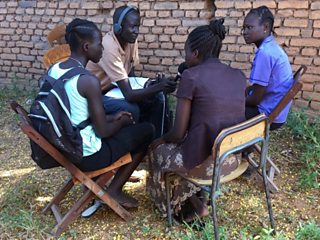Shining a light on girl's education in South Sudan
Kenyi Betuel
Editor, Our School, South Sudan
Tagged with:
Agol Deng Tong dreams of going to university and setting up her own business, but living in rural South Sudan - with no electricity - made studying in the evening difficult. But Agol was determined this wouldn’t stop her passing her exams. Radio programme ‘Our School’ shared her innovative solution to show how girls are tackling barriers to education across the country – and to inspire others to do the same.
"Anything a man can do, you can do as a girl if you’re educated. Never think marriage is the only answer, I ensure that I am in school because I know that later I’ll be better off," says 21-year-old Agol Deng Tong.
But every day, girls like Agol face challenges which impede their schooling, and their future. Dangers of travelling to school in the dark, affording school fees, traditions of prioritising sons’ education over daughters, or displacement through conflict are some of the many complex barriers to education.
Living in Aweil – a rural area where there’s no public electricity - Agol’s family struggled to provide even a torch light to help her do her homework.
But often difficult situations can inspire innovative solutions – and Agol proved it.
The light bulb moment
Agol decided to make the journey to the nearest hospital to study in the evening because it was one of the few buildings in the area with an electricity supply. "On the first day I just went, sat and started reading and when they asked why I was there, I explicitly told them that I don’t have light for reading and the staff looked into it and they allowed me in most of the time to read when I wanted", she says.
South Sudan has some of the . Girls, in particular, struggle to achieve educational milestones, with very few of those who complete primary school continuing onto secondary education. In 2016, 128,000 girls started primary education, but only 2,700 completed secondary.
In many rural communities there are traditional expectations that girls should take care of chores in the home rather than go to school.
But Agol says she balanced her home chores with revision: "I made a timetable, coming from school at 2:00 PM then I go fetch water and other things and after that I go to read at 5:00 PM after ensuring that I have done the home chores. And if darkness approaches then I go to where I get light to continue studying and reading."
And it paid off, Agol achieved a score of 70% in her final exams - a result most South Sudanese girls find hard to attain in the face of issues both at home and school.
Empowering girls
Radio programme shared Agol’s story to show why girls’ need support to tackle the barriers they face to education and inspire other girls to find creative ways to continue their studies.

Agol discussing the challenges girls face on βOur Schoolβ with other students in Aweil, South Sudan
Agol’s story featured alongside those of many other girls in South Sudan. For 15-year-old Easter, going to school in the dark was dangerous. Waiting until daylight meant she was missing classes.
By means of interviews with girls, their families and teachers, 'Our School' shows how these kinds of factors can affect a girl’s education. At the same time, through positive role models, the programme shows girls how they can succeed.
After listening to the radio show, started walking her daughter to school.
Making a difference
Our shows that listeners of the programme are significantly more likely to say their daughter is going to school, compared to non-listeners. And, nearly half of our audience said they had asked questions at their local schools after listening to the show. Those who tune in say they more frequently discuss education with their daughters or girls in their family too.
Many issues remain, but as Agol’s story suggests, girls in South Sudan are in a class of their own.
As she says: "I had challenges but I overcame those bit by bit until I sat for my exams and passed."
More power to you Agol.
--
Kenyi Betuel is Editor for ΒιΆΉΤΌΕΔ Media Action project ‘Our School’ – a girl’s education programme in South Sudan funded by DFID through the . The programme is produced by a team of local producers and broadcasts in nine languages.
